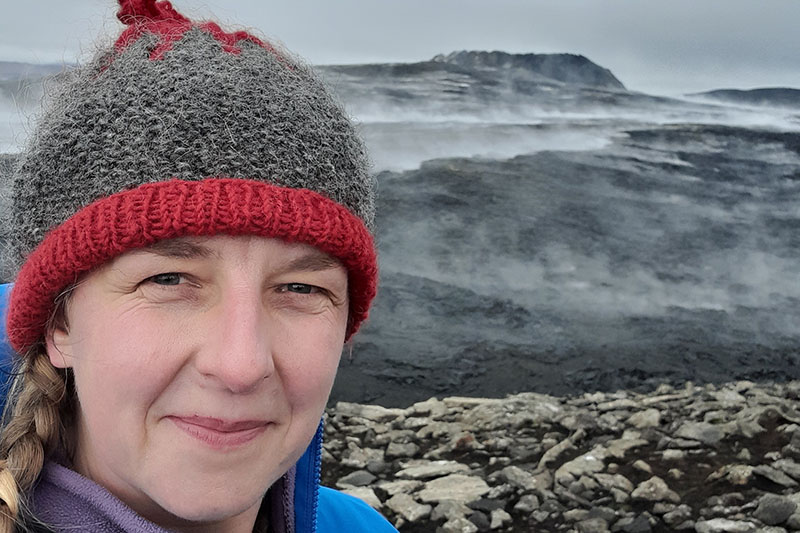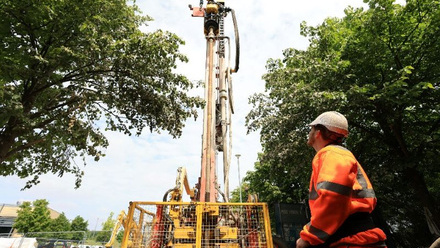Geoscience for all
Dr Natasha Dowey, Associate Professor in Sustainable Geoscience and Volcanology at Sheffield Hallam University, UK, is eager to improve equity and inclusion in the discipline.

She is also creator and lead editor of Geoscience for the Future, which showcases the links to a more sustainable future and encourages the next generation of geoscientists.
When and how did your interest in geoscience emerge?
I grew up in the mining heartlands of Cornwall, and was always fascinated by the mines, how they got there and the coastal landscapes that surrounded me. I wanted to understand the dynamics of it all, which led me to study Earth Science.
What areas of geoscience do you cover and what is their significance to sustainable development?
At Sheffield Hallam University, UK, I am one of the few geologists in our Geography and Environment team, and am lucky enough to teach a wide range of topics at undergraduate and master’s level. I previously worked in the extractive industry and teach geological solutions for net-zero and responsible critical mineral extraction.
My research specialism is in volcanology, and I also teach disaster risk reduction – a multidisciplinary topic that cross-cuts many aspects of sustainable development such as creating more sustainable cities. So many Geoscience themes are relevant to sustainable development ‒ the key thing is how we frame those topics and have those conversations.
Why are you focusing on bringing sustainable development concepts into your Geoscience teaching?
Applying Geoscience to a range of critical global challenges is the most exciting thing about our subject, and really captures students’ imaginations. To ensure a bright future for our subject, we need to encourage people to see beyond Geology as a subject of rocks ‒ geoscientists know it is so much more than that. I am keen to encourage students and the public to see it as a positive force for societal wellbeing.
In 2020, you created the Geoscience for the Future initiative – what is it and why did you feel it was needed?
I was frustrated. Many geoscientists I spoke to blamed the media or the public for poor perceptions of our subject. I had a sneaking suspicion that the real reason was more complex – that geoscientists had not historically been very good at shouting about the amazing things our discipline has done and has the potential to do. The narrative was too firmly stuck in traditional Geoscience career pathways and traditional research – and innovative, forward-thinking Geoscience wasn’t being showcased enough. It was out of that frustration that the initiative was born.
What are the challenges in recruiting the next generation of geoscientists?
There are definitely poor public perceptions, as well as inequity in our subject, and environments that are not inclusive to people from all backgrounds. I think it comes down to making changes and taking a revitalised approach to how we see and talk about our subject, not just in teaching, but in outreach, and in conversations with the public and policymakers. We need the public to understand Geoscience’s potential and not see it as belonging to the past. These challenges are not trivial and require meaningful, sustained efforts from sector leaders.
How do issues around equity, diversity and inclusion impact recruitment?
In the UK, people from diverse backgrounds and identities are very poorly represented in Geoscience. This can be seen in university entry data, which filters up through the system, with poor retention of a diverse student body into postgraduate research. This situation inevitably impacts recruitment into professional Geoscience.
Many factors contribute to this, including the historical legacy of the subject, poor perceptions and stereotypes, and the inaccessibility of fieldwork to some groups. These issues are now better documented than ever before, and are being discussed and worked on by many across the discipline – but much more effort is needed, both in terms of funding of initiatives to improve the situation, and support from senior leaders in recognising and addressing inequity.
The lack of diversity is a significant problem for equity and a sense of belonging for all those who work in the discipline. It also impacts out ability to contribute to global challenges that involve conversations with communities from all walks of life.
You talk about the importance of decolonisation of Geoscience education – what do you mean by that?
There are different definitions, but Keele University uses a good one. 'Decolonising the curriculum means creating spaces and resources for a dialogue among all members of a university on how to imagine and envision all cultures and knowledge systems in the curriculum with respect to what is being taught and how it frames the world'. Geology was used for colonial expansion, and colonialism shaped how geological knowledge was created. Decolonising the curriculum is not about banning the work of old, white, dead men, shaming people, or simply changing reading lists ‒ it is about exploring the origins of what we are teaching, questioning who is represented, and who created that knowledge and why.
Finally, why do we need more geoscientists in the world?
Geoscience is critical for many of the global challenges we face as a society: the resources we have, the energy we create, the houses we live in ‒ so many of our basic needs are related to the Earth. We need a new generation of geoscientists, from a range of backgrounds and experiences, to be excited about tackling those challenges for a more sustainable future.
To find out more about Geoscience for the Future, visit geoscienceforthefuture.com







